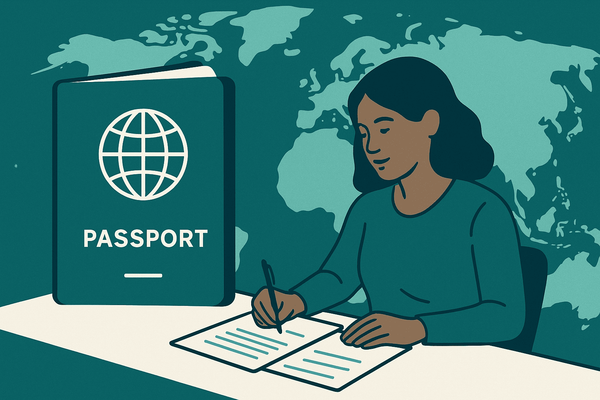Best and worst U.S. domicile states for American nomads

For American nomads, choosing the right state to keep as your domicile is essential to minimizing tax obligations and helping you stay compliant. Establishing domicile in a carefully selected state can save you thousands of dollars each year and simplify bureaucratic headaches.
Key factors:
- State Income Tax: Some states have no income tax, while others impose substantial taxes on income, including worldwide earnings.
- Residency Requirements: The ease of establishing and maintaining residency varies widely across states.
- Foreign Earned Income Exclusion (FEIE): Only a few states allow nomads to benefit from federal tax exclusions, which can reduce tax burdens.
- Physical Presence Requirements: Frequent travelers need to consider states with minimal physical presence obligations.
Group 1: Easy residency, zero-state income tax
These states often offer one of the most attractive balances for nomads by having no state personal income tax and relatively minimal residency requirements. They tend to work well for digital nomads and frequent travelers who want to reduce state-level tax exposure without being tied to a specific location.
Based on our experience and research, Florida and South Dakota are often the most straightforward options for nomads, because of their relatively simple residency requirements and zero state personal income tax policies.
#1 Florida
Florida is one of the most popular domicile states for nomads because it has no state income tax, minimal residency requirements, and strong asset protection laws. Additionally, obtaining a Florida driver's license is essential for establishing domicile and fulfilling various legal responsibilities. Florida’s proximity to major international airports makes it convenient for frequent travelers.
Key benefits:
- Close to major cities and international travel hubs, beneficial for frequent travelers.
- Residential-address services like SavvyNomad can provide a bona fide Florida residential street address and help you organize documentation as part of a broader plan to establish domicile, but they do not by themselves determine your residency status or tax outcomes.
- Strong asset-protection laws.
- In many situations you can complete Florida vehicle registration without bringing the car into the state, by using out-of-state VIN verification or prior-title documentation, subject to current DMV rules.
- No state personal income tax on wages, investment income, or other personal income, regardless of where it’s earned.
Drawbacks:
- Residential address requirement: Nomads must have a livable residential address in Florida; a compliant residential-address service can help with documentation, but you still need to treat Florida as your long-term home under its rules.
- Initial VIN/vehicle verification: A verification is required when registering certain vehicles from out of state, but it can often be completed via approved officials outside Florida, which reduces the need to physically bring the car into the state.


#2 South Dakota
Establishing a domicile in South Dakota is a popular choice for many nomads.
It is important to have a legal address in South Dakota for establishing domicile, which is crucial for tax and administrative obligations. Questions about voter registration or eligibility must be directed to election officials; where applicable, registration is only a supporting indicator and not determinative on its own.
Key benefits:
- Minimal bureaucratic requirements can make it attractive for many nomads and travelers who plan carefully around the updated physical-presence requirements.
- Streamlined vehicle registration process where many steps can be handled remotely or online, subject to South Dakota’s current documentation and physical-presence rules.
- No state personal income tax, which can provide meaningful savings compared with higher-tax states, depending on your income mix and prior state.
Drawbacks:
- Recent legislative changes: In 2023, South Dakota increased the physical presence requirement and restricted the use of personal mail boxes for voting and payroll purposes.
- Voting considerations: Voter registration typically requires a
residential address; requirements vary by jurisdiction—consult election
officials. - Payroll tax complications: In 2023, South Dakota increased physical-presence requirements and limited use of personal mail boxes for certain purposes
(e.g., payroll). For voter registration or eligibility, consult election officials - Less RV-friendly: Recent policy changes have made the state less accommodating for RVers.
- Physical presence requirement: Requires proof of at least one overnight stay in the state every 5 years to renew a South Dakota driver’s license.

Group 2: Zero-tax with moderate residency rules
In this group, we have states that generally don’t levy a broad personal income tax on wage and salary income, but they come with more stringent residency requirements or other complications that might make them less suitable for some digital nomads.
These states can still be a good choice depending on individual circumstances, but they might not offer the same level of flexibility as Florida and South Dakota.
Establishing a new domicile in these states involves significant steps, including updating address details with various institutions and taking legal steps to demonstrate commitment to the new location.
States:
- Alaska
- Nevada
- New Hampshire
- Texas
- Tennessee
- Washington (no tax on wage income, but a state capital-gains excise tax applies to certain long-term gains above threshold amounts)
- Wyoming
Texas
Establishing a domicile in Texas is a popular choice for nomads due to the absence of state income tax.
in Texas, but it is not determinative on its own. Eligibility and address
requirements are set by election officials.
Key benefits:
- Residential address required: Must have a livable residential address for residency, which can be restrictive for some nomads.
- 30-day residency requirement: You generally must be in the state for 30 days before getting a Texas state ID or driver’s license.
- Car registration and inspections: You’ll still need to register your vehicle in Texas, and commercial vehicles (and vehicles in certain counties) remain subject to inspections and emissions testing, but as of 2025 most non-commercial vehicles no longer require an annual state safety inspection to complete registration.
Drawbacks:
- Car registration: The vehicle must be in the state for a safety check.
- 30-day residency requirement: Must be in the state for 30 days before getting a state ID or driver’s license.
- Annual vehicle inspections: Every vehicle registered in Texas requires an annual safety inspection.
- Residential address required: Must have a livable address for residency, which can be restrictive for nomads.

Nevada
Nevada is another state with no state personal income tax on wage and salary income, which makes it attractive for many nomads. Mail-forwarding and virtual-mailbox services can help you manage important documents like tax papers and vehicle registrations while traveling, but they do not by themselves establish domicile, you still need to meet Nevada’s residency and documentation requirements.
It has relatively simple residency requirements and broad health insurance options, which is a bonus for those looking to maintain U.S.-based coverage while abroad.
Key benefits:
- Driver’s license renewal: Every 7 years.
- Health insurance options: Broad range of ACA-compliant options.
- Access to international airports: Extensive options, beneficial for frequent travelers.
- No state personal income tax: This can provide substantial state-tax savings compared with higher-tax states, depending on your situation.

Drawbacks:
- 30-day stay requirement: Must show a 30-day consecutive stay in the state for residency.
- Annual smog checks: Required for vehicle registration, particularly in populous counties like Clark County.
- Car registration: Vehicle must be in state for smog check (for most counties).
- Residential address required: Must have a livable address for residency.

Group 3: Clear exit states (objective, documentable nonresident tests)
These states aren’t zero-tax, but they give nomads clear, rule-based paths to be treated as nonresidents—if you follow the tests precisely and keep airtight records. Think of them as the most predictable non–zero-tax options for proving status.
Ohio
Ohio presumes you’re a nonresident when all of the following are true:
- You have ≤ 212 contact periods in Ohio during the tax year, and
- You maintain your abode outside Ohio, and
- You file the nonresident statement (Form IT NRS). Meet the trio and you get a statutory presumption; miss any element and that presumption can fall away. Keep contemporaneous travel logs and proof of your out-of-state abode.
Pennsylvania
Pennsylvania treats you as a nonresident when all of the following are true:
- ≤ 30 days physically in Pennsylvania during the year, and
- No Pennsylvania abode, and
- An abode elsewhere for the full year. Pennsylvania’s test is strict and documentation-heavy; plan your calendar and housing so the facts line up cleanly.
Documentation to keep (both states): passport stamps/itineraries or app-based day logs; lease/deed and utility proofs for your outside-state abode; copies of Form IT NRS (Ohio) and any PA residency representations; and a one-page summary tying your dates and housing facts to the test you’re relying on
Group 4: AGI-conforming states (FEIE often passes through for nonresidents)
These states generally start from federal adjusted gross income (AGI), so your federal Foreign Earned Income Exclusion (§911) typically carries through at the state level if you’re treated as a nonresident of that state.
If the state still considers you a resident/domiciliary, it can tax worldwide income (often with its own credit limits and documentation rules).
Keep your residency facts clean: no in-state abode, careful day counts, and consistent addresses across IRS, banking, insurance, payroll, and other records.
States:
- Alabama (Residents can claim a resident Foreign Tax Credit only for certain PTE-level foreign income taxes; strict documentation and “same-income” tie-out required).
- Colorado
- Georgia
- Illinois
- Indiana (Residents can claim a resident Foreign Tax Credit for foreign income taxes (general) with standard “same-income” and documentation tests).
- Iowa (Residents can claim a resident Foreign Tax Credit for foreign income taxes (general); expect routine documentation checks).
- Kansas (Residents can claim a resident Foreign Tax Credit for foreign income taxes (general); normal net-income and tie-out rules apply).
- Kentucky
- South Carolina
- Utah
Group 5: States taxing worldwide income (until domicile ends)
These jurisdictions tax residents on their worldwide income and keep doing so until you truly end domicile and establish a new one elsewhere. In practice, audits hinge on facts and intent—think where you actually live, sleep, work, and keep your life ties.
Keep your residency picture clean: no in-state abode, disciplined day counts, and consistent addresses across IRS, banks/brokerages, insurance, payroll, and key accounts.
States:
- Arkansas
- Arizona (Residents can claim a resident Foreign Tax Credit for foreign income taxes (general); must be a net income tax on the same income and fully documented).
- Connecticut
- District of Columbia
- Delaware
- Idaho
- Louisiana
- Michigan (Residents can claim a resident Foreign Tax Credit for Canadian provincial income taxes only; Canada-only and enforced strictly).
- Maine
- Maryland
- Massachusetts (Residents can claim a resident Foreign Tax Credit for Canadian provincial income taxes only; Canada-only and enforced strictly).
- Minnesota (Residents can claim a resident Foreign Tax Credit for Canadian provincial income taxes only; Canada-only and enforced strictly).
- Missouri
- Mississippi
- Montana (Residents can claim a resident Foreign Tax Credit for foreign income taxes (general), but it is reduced if a federal FTC is also claimed on the same income; examiners often request Form 1116 to verify no double benefit).
- Nebraska
- New Mexico
- North Carolina (Residents can claim a resident Foreign Tax Credit for foreign income taxes (general); must be a net income tax on the same income with complete proof).
- North Dakota
- Oklahoma
- Oregon
- Rhode Island
- Vermont (Residents can claim a resident Foreign Tax Credit for Canadian provincial income taxes only; Canada-only and tightly enforced).
- Virginia (Residents can claim a resident Foreign Tax Credit only for certain foreign pension/retirement income from prior foreign employment; narrow and documentation-heavy).
- West Virginia
- Wisconsin
Foreign domicile (what actually ends domicile abroad)
You can break resident-worldwide exposure by establishing a new domicile outside the U.S., but this is usually more documentation-intensive than relocating to a U.S. no-tax state like Florida. Expect to assemble:
- Immigration status: visa or residency permit approvals.
- Housing: foreign lease/deed in your name.
- Tax presence: local tax ID/certificate and, where applicable, filed returns or assessments.
- Life-admin shifts: banking/ID changes and routine life ties in the new country.
High-scrutiny states closely test intent and facts, so line up your paperwork and keep contemporaneous records (travel logs, housing, employment/contract evidence).
Group 6: Worst possible states for nomads
These four are the toughest for American nomads. They combine high top marginal rates with worldwide income taxation for residents, aggressive residency audits, and limited relief for foreign-taxed income.
If you’re domiciled in one of them but living abroad, you’ll generally owe state tax on your global income until you change domicile.
For many nomads, moving domicile to a Group #1 or #2 state can meaningfully reduce tax and simplify compliance.
States:
Key characteristics:
- Highest state tax rates: These states have some of the highest state income tax rates in the country.
- Worldwide income taxation: Residents are taxed on their global incomes with no exclusions.
- Complex tax regulations: These states have detailed and complicated tax filing requirements that can be challenging to navigate.
California
- High State Income Tax: California has one of the highest state income tax rates, reaching up to 13.3%.
- Worldwide Income Taxation: All income earned globally is taxed with no exclusions.
- Complex Compliance: Detailed tax laws and regulations require extensive documentation and may necessitate professional tax assistance.
Audits focus on documentation—expect requests for your contract, flight records, and housing leases. This rule does not change domicile; it’s best for clearly defined 18–24-month assignments.
For long or indefinite stints abroad, ending California domicile (e.g., establishing Florida) is usually simpler and more durable.
New York
- High State Income Tax: New York’s state income tax rates can reach up to 10.9%, and when combined with New York City taxes, the total rate can go as high as 14.776%.
- Worldwide Income Taxation: All income earned globally is taxed with no exclusions.
- Complex Filing Requirements: New York’s tax laws are intricate and compliance can be difficult without professional assistance.
- Resident foreign tax credit (Canada-only): New York is one of the Canada-only credit states—resident credits apply to Canadian provincial income taxes (with strict documentation) but not generally to other foreign countries. Have proof of payment, the foreign/provincial return/assessment, and a tie-out of the foreign-taxed income to your NY return lines.
Examiners are strict on day counts and housing and often request passport stamps, travel logs, and employer verification. This safe harbor does not change domicile; it’s best for clearly defined foreign assignments.
For long or indefinite stints abroad, it’s generally simpler to end New York domicile (e.g., to Florida) to avoid ongoing day-count scrutiny.
Hawaii
- High State Income Tax: Hawaii’s state income tax rates can go up to 11%.
- Worldwide Income Taxation: Residents are taxed on their global incomes with no exclusions.
- Complex Compliance: Hawaii’s tax laws and regulations are intricate, requiring careful planning and, often, professional assistance to navigate.
- Resident foreign tax credit (FTC): Hawaii is among the states that allow a resident credit for foreign income taxes (subject to strict sourcing limits and documentation). Examiners expect proof of payment, copies of the foreign return/assessment, translations if needed, and a tie-out of the foreign-taxed income to your Hawaii return lines.
New Jersey
- High State Income Tax: New Jersey’s state income tax rates can go up to 10.75%.
- Worldwide Income Taxation: All income earned globally is taxed, with no exclusions.
- Challenging Compliance: Tax filing in New Jersey is known for its complexity, often requiring professional help to navigate the regulations.
Drawbacks:
- High Tax Burden: nomads domiciled in these states face significantly higher tax liabilities on their worldwide incomes.
- No FEIE: These states do not provide a foreign-earned income exclusion, resulting in no relief for nomads from high tax burdens on foreign-earned income.
- Complicated Tax Filing: The tax filing process in these states is complex and can be challenging to manage, often requiring professional tax assistance.









